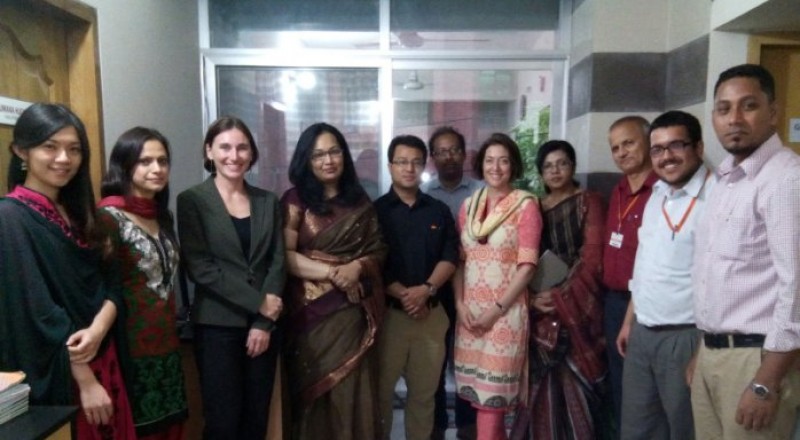The 12th International Conference on Urban Health being held in Dhaka, Bangladesh from May 24 to May 27 also provided good opportunity for South Asian delegates to share their country specific experiences and find commonalities within the specific interventions for a general South Asian understanding and subsequent response.
A special session was held during the conference on May 26 titled ‘Designing Household Surveys that Capture the Health and Socio-Demographic Status and Needs of the Urban Poor’. This session was funded by University of Leeds, UK and chaired by Helen Elsey, Lecturer at the University. The session was represented by five organisations/institutions:
- Health Research and Social Development Forum (HERD), Nepal
- ARK Foundation, Bangladesh
- Urban Health Resource Centre, India
- Department of Global Health and Social Medicine, Harvard Medical School, USA
- University of Leeds, UK
The introductory session presented by Helen Elsey (representing University of Leeds and HERD) and Ru-yi Lin (representing ARK Foundation) discussed on the challenges and limitations of existing, large nationally representative surveys in identifying the needs of the urban poor.

The session was followed by a presentation by Siddharth Agarwal from Urban Health Resource Centre, India discussed about the sampling strategies to identify and recruit the urban poorest as well as issues surrounding defining a household in the context of urban vulnerability and poverty.

Dana Thomson from Department of Global Health and Social Medicine, Harvard Medical School discussed about the innovative sampling and enumeration methods to measure demographic and health outcomes in the urban poor settings.

Uden Maharjan from HERD shared the Nepal experience on use of spatial mapping in an urban household survey; the challenges and the lessons learnt.

Commitment of Collaboration
HERD and ARK Foundation also had an informal sharing meeting at ARK Foundation office in Dhaka on May 26 where officials from both the organisations shared their current project involvements. This briefing was particularly important for both the organisations to understand the common issues of interest and discuss possibility of collaboration through joint applications in future calls as well as sharing of any specific experience/expertise to each other for the benefit of both the organisations in terms of knowledge sharing and capacity building.
Both the organisations are funded by University of Leeds through some projects on Urban Health and Helen Elsey also opined of developing an Urban Health Sharing Platform through the communications officials to institutionalise cross country sharing on a regular basis.
Sharing Session on Research Uptake and Communications
Sudeep Uprety, Research Uptake and Communications Officer at HERD conducted a brief sharing session on Research Uptake and Communications practice at HERD. Initially, he discussed about Research Uptake (RU) through DFID lens based on the reference of Research Uptake Guide for DFID funded research programmes published in May, 2013. This document talks of understanding RU through supply and demand of research. Sudeep briefly discussed on 4 RU Strategies: Stakeholder Engagement, Capacity Building, Communication and Monitoring and Evaluation.
Furthermore, he discussed about how HERD developed its RU and Communications Unit institutionally with guidance from University of Leeds, particularly through RU Manager, Dr. Nilam Ashra McGrath. Sudeep also explained about the stages involved in RU and Communications namely Process Documentation, Write Up, Editing and Finalisation of Final Deliverables (Reports, Guides) and Development of Research/Policy Briefs.

Sudeep also gave some useful tips for organisations to institutionalise RU and Communications that are new to this concept:
- Before communicating any project related activities/events, clarity of goals and audience is required and special consideration should be given to stakeholder interests
- RU and Communications Officers should have adequate knowledge and understanding of projects – not entirely technical but at least the aim, objectives and purpose of the project
- There should be time to time discussions of Senior Management with core staff about how to highlight the organisation and its activities
- RU officers if involved in proposal writing, could be really beneficial to understand the project context
- There could be a guideline on RU is all about creativity; being well versed with development context; funder priorities and thinking about where the organisation fits in
This highly beneficial interactive and informal discussion between the two organisations ended with warm hospitality by Rumana Huque, Executive Director of ARK Foundation hosting HERD team a dinner reception serving us with mouth watering local Bangladeshi delicacies.
Contributors: Dr. Sushil Baral and Sudeep Uprety



Comments(0)
No comments found.